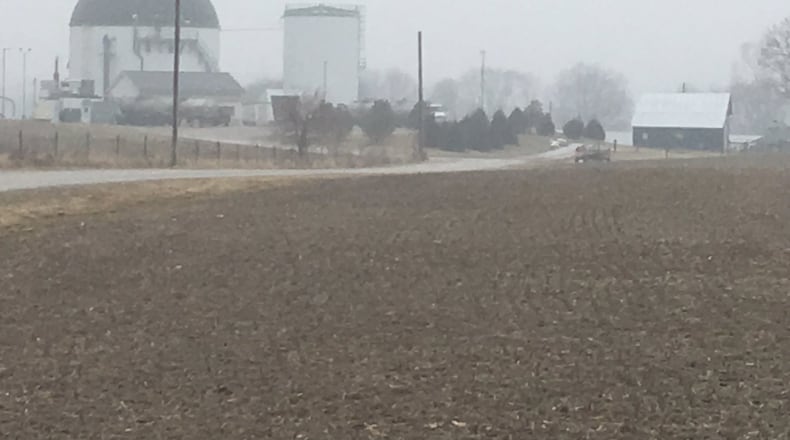“The stink goes far. Far and wide. And it’s gaggy, sickening. It’s not your typical pig odor,” said Nancy Clevenger, who lives about a half-mile away. “It affects my eyes, my head, my stomach. Those trucks go by my house open-topped … The smell can knock you over.”
STAY CONNECTED: Greene County News on Facebook
The Ohio Environmental Protection Agency this month investigated a complaint about odors coming from the farm, but found no violations, according to Ohio EPA spokeswoman Dina Pierce.
“Ohio EPA has investigated odor complaints in the past at this location. Past issues were identified with land application of biosolids, which are solid materials that are left over after the digestion process,” Pierce said. “Ohio EPA worked with the facility owners to address those issues and those issues were corrected.”
The owner of the farm, Bath Twp. Trustee Tom Pitstick, said the material that is trucked into the farm comes from wastewater treatment plants in Greene and Butler counties, as well as from Fairborn, Xenia and Yellow Springs.
“Greene County was hauling it to Bellefontaine where it was put in a landfill,” Pitstick said. “It’s now generating electricity, green energy, and being converted to a fertilizer, an excellent fertilizer that is high in organic matter.”
Kassie and Ron Lester live a few houses down from the farm on the other side of Herr Road. They said they have many concerns, not just the smell, but the increased semitrailer traffic which they say is “tearing up the roads,” and when the trucks spill parts of their sloshy loads onto the roadway.
“It’s bringing in commercial waste, it’s bringing in biosolids from other facilities,” Kassie Lester said. “It can cause runoff when it’s applied to the fields. It can get into our groundwater … We’re concerned about the exposure, the risk to all the residents around the fields … We’re worried about our house valuations … Our houses are not worth what they used to be.”
The Lesters filed a zoning complaint with township officials earlier this month, claiming the farm’s agricultural exemption status is not accurate, and that the property should be zoned for commercial/industrial use.
MORE: New details: Explosions in Kettering may involve device made from household items
“If this gets into the aquifer, it’s going to effect the city of Dayton,” Kassie Lester said of the concern for the retention pond on the farm that holds all the product after it goes through the biodigester.
The Lesters’ complaint was denied. The attorney representing the township, Greene County Assistant Prosecutor Stephanie Hayden, wrote the response to the complaint, stating that the state determines what qualifies under zoning codes, and Pitstick Farms operations fall under the agricultural exemption status.
“Contained in the list of agriculturally related exemptions are zoning exemptions for biodiesel production, biomass energy production, electric or heat energy production and biologically derived methan gas production,” Hayden’s email states. “Once a property qualifies for the zoning exemption, there is simply nothing that the township zoning, administrator, the township trustees, the prosecutor’s office or any other county office can do from a zoning perspective.”
Pitstick said the biodigester operation is run by Dovetail Energy, also known as Renergy, Inc., with whom he has a long-term lease agreement. He said the product that comes out is mostly free of pathogens that can cause disease.
Pitstick said there is no real threat of a leak from the lagoon that holds the fertilizer, which he said has 16-inch thick walls of concrete, and a base of 2,000 yards of concrete.
MORE: Jail administrator: New facility, ‘new paradigm’ needed in county corrections
“We are a family operation with my son, daughter, son-in-law and grandchildren all involved in the farming operation,” Pitstick said. “We have always tried to be good stewards of the land and find it very hurtful when people who have only lived in the neighborhood a few years spread half truths and outright lies. We are well respected by most of our neighbors and our community.”
Renergy issued a statement in response to the concerns in the neighborhood:
“Renergy is proud of our efforts to make agriculture more sustainable and to make electricity out of materials that would normally go to a landfill and create harmful methane gas. We take our responsibility to our communities and the environment very seriously, and we work with the Ohio EPA. Last year, we diverted enough waste that would have gone to a landfill to generate power to keep lights on in 2,000 homes with renewable energy.”
Pitstick said there are plans to expand the biodigester operations on the farm. The Lesters said they are working with the Ohio EPA to hold a public hearing on the matter next month.
Ohio EPA records
April 2017 biosolids runoff complaint
About the Author
